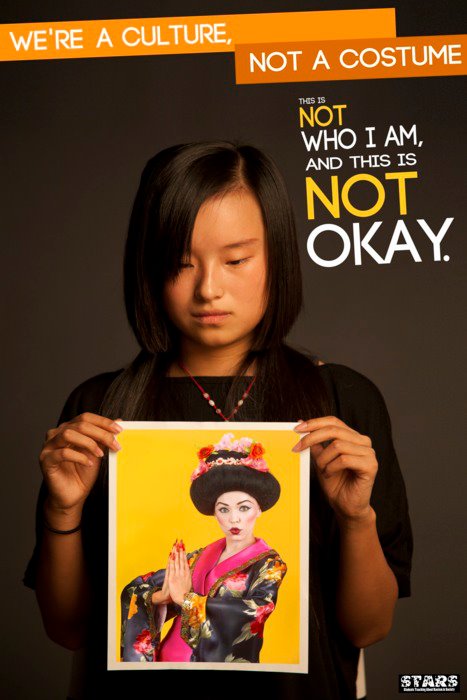What not to do on Halloween
I know that most of you reading this are amazingly cool and awesome. But you may have friends who, um, aren’t. Maybe you have a white friend who thinks dressing up in blackface or yellowface is hilarious and completely appropriate for Halloween? I hope not. But if you do, shoot ’em this link.
The campaign is called “We’re a culture, not a costume,” and it was created by students at Ohio University. The posters are great:
I personally find it almost mind-boggling that anybody in this day and age would think blackface was appropriate. Did these people grow up in alien space pods or something?
As for the geisha stuff, somebody (a non-Japanese American) asked me the other day what the problem with that was. I tried to explain that goofy “geisha girl” costumes, like the one in that poster, perpetuate the fetishization and marginalization of Asian women as some exotic sexualized “other.” Not sure the message got through.
Follow @SuzanneScoggins
Follow @TakeHalloween



seema goel
14yearsago
I just saw my first Pocahontas costume in Dublin. Yikes! Disney just makes things worse.
prairienymph
14yearsago
I have always wondered about cross-cultural dress. I lived for a while in India and wore the standard dress of the people I lived with: saris. While I usually wear jeans and a t-shirt, sometimes I love wearing saris. Unfortunately, I am pale skinned and have light hair. I am always afraid to wear saris outside the house because I feel like my hair colour doesn’t give me the right. Maybe this is silly.
Most people of Indian heritage that I know appreciate that I wear them once in a while, but I always worry that other people I don’t know will be offended.
Last Halloween I wore a sari and went as the goddess Kali. Halloween is the one time I feel allowed to wear clothing from any other culture (including my own ethnic backgrounds).
Do you have advice for someone who just admires a culture and doesn’t want to ‘colonize’ it?
Michelle
14yearsago
This is a tricky one for me. My mother loved Japanese culture and dressed me as a ‘geisha’ when I was 6. This year, I put my 4 year old in a vintage kimono and sent her out as a Japanese girl as an alternative to spending $30 on mass produced junk. (I left the ‘geisha’ label behind as it’s not appropriate for kids.)These costumes were created with a love for the culture. I don’t feel they were disrespectful. However, the logic stands that if blackface is wrong (and it is, without question) is there ever a time when it’s okay to ‘put on’ another culture?
Suzanne Scoggins
14yearsago
prairienymph said:
I think there are two issues in your question. One is about wearing saris, and the other is about Halloween.
First: Saris aren’t a costume. They’re just a garment, like a kimono or a yukata, a poncho, bluejeans, a cowboy hat, a sarong. People all over the world wear these items of clothing. Saris don’t have quite the universal appeal of those other items (perhaps something to do with six yards of fabric that have to be draped and pleated…) but I don’t really think you have to be Indian to wear them. Lots of non-Indian women adopt the sari, at least for formal occasions, when they move to India or marry Indian men. It’s kind of a “when in Rome” thing. That’s just my opinion, of course.
Second: There was a good discussion in the comment thread at Jezebel about the issue of people wearing costumes that belong to a different ethnic or cultural heritage. The gist of it is: dressing up as “a culture” is a bad idea, since that is necessarily stereotypical and offensive, but if you want to costume yourself as a real person in history or a mythological figure, and do it authentically and respectfully, that’s okay.
I would generally agree, though I would still urge people to use common sense and some situational ethics. I think a good rule of thumb is to ask yourself, “Would I feel comfortable wearing this costume in a room full of people who are actually part of this culture or ethnic group?” For example, if you’re a white woman, is it really a good idea to dress up as Sojourner Truth for Halloween? Is that really an appropriate thing?
At the opposite end of the spectrum, dressing up as a Sumerian is something that I think every human being on this planet should feel free to do. Sumer is part of world heritage; it belongs to us all. It’s the place where, 6000 years ago, our species first began the journey we’re all still on. I don’t believe that Sumer is only for people who can trace their personal ancestry to Iraq.
This isn’t math; there aren’t absolutes. It’s a question of common sense and cultural sensitivity and being a good world citizen.